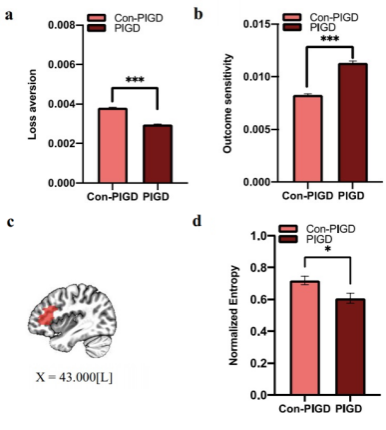Internet Gaming Disorder (IGD), a newly recognized form of behavioral addiction characterized by excessive involvement in online gaming, is gaining global attention as a significant public health issue. Mirroring other substance and behavioral addictions, previous studies have established that IGD patients suffer damage to delay discounting, a major aspect of value-based decision-making. However, the impact of another key aspect of value-based decision-making, loss aversion, is less understood in the context of IGD.
A research team led by Professor ZHANG Xiaochu from the University of Science and Technology of China(USTC)of the Chinese Academy of Sciences(CAS)innovatively examined the alterations in loss aversion, a critical aspect of value-based decision making in IGD, and its associated changes in brain networks. Their findings could contribute to the diagnosis and classification of this disorder. The study, titled "Reduced loss aversion in value-based decision-making and edge-centric functional connectivity in patients with internet gaming disorder", was published online on May 19th in the Journal of Behavioral Addictions.

Changes in Loss Aversion and Brain Functional Networks in Individuals with Internet Gaming Disorder
The study utilized the Iowa Gambling Task (IGT), a well-regarded paradigm for assessing value-based decision-making. Accumulating research leverages computational models to delve into the value-based decision-making process underlying the IGT, including loss aversion. Whether it's in marijuana addicts or polysubstance addicts, significant reductions in loss aversion within value-based decision-making have been observed.
In this study, IGD participants and healthy control participants performed the IGT under functional magnetic resonance imaging (fMRI) scans. Through a computational model, the team explored whether loss aversion within value-based decision-making was impaired among IGD sufferers and if there were changes in the corresponding brain functional networks.
The research findings echoed those of prior studies: individuals with IGD, like those with other substance or behavioral addictions, exhibited a notable impairment in loss aversion within value-based decision-making. At the neural level, the changes in loss aversion did not relate to node-centric changes in functional brain networks. Instead, they were associated with the overlapping community features of edge-centric functional networks involved in reward evaluation and processing (left inferior frontal gyrus, right caudate, and right hippocampus).
Machine learning-based classification analysis demonstrated that the loss aversion within value-based decision-making and the related edge-functional networks could distinctly distinguish between IGD participants and healthy control participants. This study holds significant implications for a better understanding of IGD and the development of future treatments, indicating that impaired loss aversion could potentially serve as a diagnostic marker for IGD.
Paper link: https://akjournals.com/view/journals/2006/aop/article-10.1556-2006.2023.00014/article-10.1556-2006.2023.00014.xml